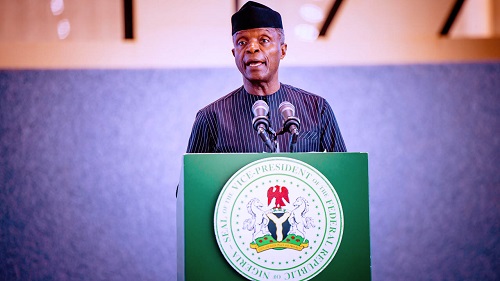With an all-of-society approach, Nigerians must shun the disaster of corruption, embrace honesty and unite to build a great country, because integrity and trustworthiness are vital attributes for success, according to Vice President Yemi Osinbajo.
The Vice President stated this, yesterday, at the official launch of the Economic and Financial Crimes Commission’s (EFCC) Integrity and Zero Tolerance Manual for school clubs, held at Model Secondary School Maitama, Abuja.
The Vice President praised the initiative as “recognition that integrity, honesty and trustworthiness are crucial individual and collective attributes for successful people and communities. Every corrupt act is not just a crime; it is a crime against society and even children yet unborn.”
Osinbajo noted that establishment of the clubs is “a vital step in finally achieving this milestone in building of the future against the disaster of corruption.”
He described the initiative as visionary and timely because “we must develop an anti-corruption army. That army is waiting in our schools, and we must teach them early that corruption is the worst destroyer of destinies and people, and we must fight it as you fight a mortal enemy in war.”
Speaking at the event, which attracted dignitaries and members of the club in the school, the Vice President noted that the establishment of EFCC Integrity clubs in schools across the country is important because it embodies the values of honesty and hard work toward national development.
Continuing, Osinbajo said: “Every public officer who steals, robs the Nigerian society of funds for healthcare, education etc must be held accountable. We must become policemen against corruption and wrongdoing; whether it is a member of government or a shop assistant or your friend in class who is cheating, because they destroy our reputation.”
Emphasising the need for integrity in society and for all Nigerians to project right values, Osinbajo observed that if the country’s reputation is deemed poor by others, “it will affect all of us.”
According to him, Nigerians, especially the youth, must discard the false notion that “we can get ahead by cheating or stealing whether in public or private life.” He noted: “There are always consequences for wrongdoing.”
The Vice President also observed: “The greatest challenge which we face, currently, is how to safeguard the youth from the ethical crisis and confusion confronting our nation, and the error of thinking that there will be no consequence for defrauding others, your employers or the government.
“The reason why people may believe these false notions is that there seem to be many in our society whose wealth cannot be explained, many even among the young who live by defrauding others.”
Emphasising further, the Vice President noted: “It is an error to think that corruption pays. Many societies in the world were where we are today, but soon, they realised that no society can survive by dishonesty, greed and theft. The society will eventually collapse. What those societies did was take an all-of-society approach to fight dishonesty.
“The other fact is that many who think they can get away with corruption, are often surprised that the long arm of the law, even if sometimes slow will eventually catch up with the criminal.
“There is no time bar or statute of limitation against a crime. A man who steals this year can be arrested in 10 years’ time for his crimes, so when you steal, you cannot sleep with both eyes closed.”
Commending the chairman of EFCC, Mr. Abdulrasheed Bawa, for the initiative, the Vice President recalled his personal journey in the advocacy for integrity in Nigeria.
“Sometime, last year, the EFCC chairman while sharing one of his many ideas on anti-corruption strategies with me, told me about the plan for Integrity clubs in schools across the nation.
“I told him my own journey in the advocacy for integrity in Nigeria. How in 1995, I co-founded the organisation, Integrity, in Nigeria with Mr. Soji Apampa. Out of it came the Convention on Business Integrity. One of the programmes of that organisation, Integrity, was the establishment of Integrity clubs in schools. But we never quite achieved it.
“This is why I feel a deep attachment to this project and I’m particularly pleased that I’m able to witness the launch of the Operations Manual for Integrity and Zero Tolerance Clubs.”
The event also featured a welcome address by the EFCC chairman, as well as goodwill messages from several government agencies and representatives of the National Assembly, among others.



